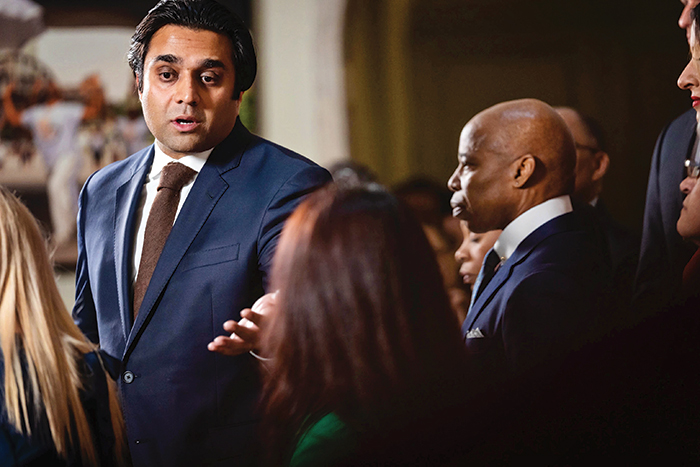Photo Courtesy of Ed Reed/Mayoral Photography Office
“Unfettered, unregulated access to social media is a toxin, and a public health crisis, with risks of serious harm for the mental health and wellbeing of our youth,” Health Commissioner Vasan said.
By Forum Staff
Mayor Eric Adams and City Department of Health and Mental Hygiene (DOHMH) Commissioner Dr. Ashwin Vasan on Tuesday announced that the Adams administration will host a high-level summit on social media later this week — assembling national experts to lay out potential pathways for action to protect the mental health of children and youth who use social media regularly. The summit will include representatives from government, academia, advocacy, and youth work, as well as young people themselves, as they discuss strategies to minimize the devastating impact on mental health.
More than 120 participants are invited to the gathering hosted at a space donated by the Rockefeller Foundation to discuss topics ranging from research and evidence surrounding social media use for young people to opportunities for local leadership, as well as policy and advocacy. The participants were selected based on their work on youth, mental health, and social media.
The summit was first announced in March as one of the strategies included in “Care, Community, Action: A Mental Health Plan for New York City.” It also follows a report from the U.S. Surgeon General Murthy that recognized potential harms to young people due to social media, and is the first stake in the ground towards a longer-term citywide strategy to address social media as a potential public health threat.
The summit also comes amid a growing need to provide services, as well as to identify threats to young people’s wellness. For example, in 2021, 38 percent of New York City high schoolers reported feeling so sad or hopeless almost every day for at least two weeks during the past 12 months that they stopped doing their usual activities. The same year, 42 percent of Latino/a students and 41 percent of Black students reported feeling sad or hopeless, compared to just under 30 percent of white students. Additionally, over the past 10 years, rates of suicidal ideation among high schoolers increased by more than 34 percent.
“Social media may have the ability to connect us together, but unfettered access is hurting our children — encouraging them to steal cars, ride on top of subways, spread hate, and risk their lives, all while ruining their self-worth and robbing them of crucial face-to-face interactions with their peers,” said Adams. “That’s why we’re convening this summit, so we can get everyone together in one room to discuss the real impacts of social media and avoid its pitfalls.”
Vasan added, “Unfettered, unregulated access to social media is a toxin, and a public health crisis, with risks of serious harm for the mental health and wellbeing of our youth. Social media is fundamentally not designed for children or with their health and wellness in mind, even if some young people can form positive connections online. We don’t have all the answers, but public health offers the solutions — through education and prevention, harm reduction, and regulation — that can keep our kids safe. As a father and as the city’s doctor, I expect nothing less of us as community, and the time to act is now.”

